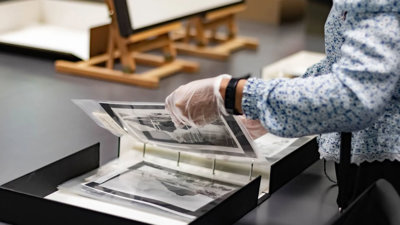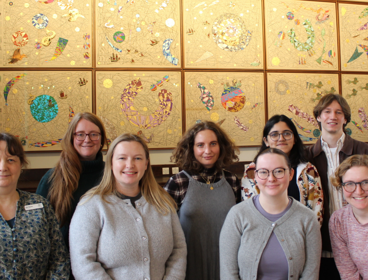The 2024 collaborative doctoral research projects have begun, with the students busy working with the Society’s Collections.
Shreya Khaund’s SMAC-funded project at the University of Warwick, supervised by Dr Thomas Simpson and Dr James Posket, is mapping fossil colonialism in Asia in the period 1810-1914. Across various locales in Asia during the 19th century, maps and other visual materials played a major role in establishing fossil fuels as exploitable resources.
Although put to work primarily in the service of imperial power and profit, fossil fuels were often extracted, understood, and employed differently in Asia. The project is developing the hypothesis that fossil colonialism in Asia was inspired by, but also crucially departed from, fossil capitalism in the Euro-Western world.
A key focus is the influence of Asian knowledges and practices on colonial representations and assessments of fossil fuels. Shreya is using visual sources from the Society's archive along with a range of other British collections in India and Southeast, Central, and East Asia, bringing largely overlooked source material to bear on a set of pressing historiographical and environmental questions.
Mika Hyman’s SMAC-funded project at the University of Cambridge, supervised by Dr Staffan Mueller-Wille, is investigating the global mobilisation of Theobroma cacao (cacao) and chocolate in the 19th and 20th centuries. The project has been developed in partnership with the Society and the Royal Botanic Gardens at Kew and is using both institutions’ extensive collections.
By tracking the movements and transformations of a culturally and economically important commodity, Mika’s project is addressing broader questions about changing agricultural, economic, and imperial climates. It will also offer many opportunities for public engagement through workshops on topics such as empire and sustainability.
Emma Yandle’s Techne-funded project at Royal Holloway University of London, supervised by Professor Felix Driver and Professor David Gilbert, is considering the historical, current and future role of the artefact collection of the Society, including the history of the Society’s museum. Emma’s project will draw on object-centred research methodologies developed in fields such as cultural geography, museum studies, and anthropology.
This involves working between objects and museum archives to contextualise processes of object accession, cataloguing, storage, and circulation. Emma will also reflect on the classification of objects as artefacts, considering their material qualities and function as museum displays.
We look forward to hearing more about the projects as they progress.
To find out more about the studentships and to apply for current opportunities, read the information for prospective students.



